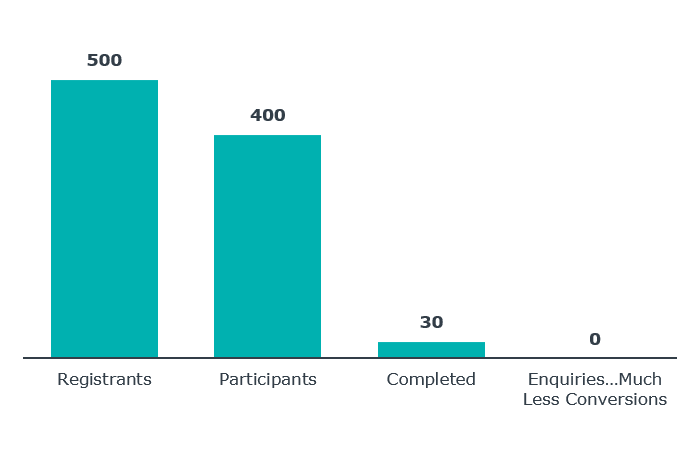- Resources /
- All /
- Research Report /
MOOCs as a recruitment tool: the University of York’s approach to ‘try-before-you-buy’ courses
September 24, 2020, By Anushka Mehta, Director
A decade after MOOC mania fuelled a burst of excitement about online education, universities find themselves at a similar crossroads, wondering whether COVID-19 will force them to rethink their educational model, course modalities, and approach to online delivery. After the hasty pivot in the spring to lecture via Zoom, Teams, or other video platforms, students and instructors alike have rightly been wary of what’s coming this autumn.
Six years ago, North American institutions began experimenting with using short-format, free-to-access MOOCs to attract adult learners, with varying results. Try-before-you-buy isn’t a new idea; it’s essentially the marketing strategy of giving away free content or goods so that someone will pay for something later. Institutions were repeatedly seeing the same results, with a downward trajectory from the number of registrants and participants to few, if any, enquiries or conversions.
One University’s All-Too Familiar Results

A new approach
At the University of York, the great virtual experiment of 2020 has given new meaning and energy to an online engagement and recruitment strategy that has been in the works for years. Since 2017, the University of York has been partnering with FutureLearn and experimenting with ‘try-before-you-buy’ MOOC courses to great success. How has York been able to buck the general trend?
Traditional approach to ‘freemium’ MOOCs:
- Not focused on the defined target audience most likely to convert
- Attendees not required to commit or complete assignments
- Traditionally in-person courses don’t translate easily to online formats
- Timeframe too long for busy working adult to finish MOOC in time to see benefit of additional education
The University of York’s approach to ‘freemium’ MOOCs:
- Specific plans to reach offer-holders and widening participation students
- Students expected to engage with peers and instructors and complete projects
- Online modality is leveraged to provide more bite-sized learning on topics that translate well online (e.g., digital citizenship)
- Modular approach allows students to drop in and out week to week to learn about what they’re interested in (i.e., new content doesn’t require knowledge of preceding week’s content)
From the outset, York defined their target audience and innovated on course content to reach A-level students. Many enrolees are either offer-holders considering their choices, or pre-applicants who are interested in exploring disciplines not offered at the secondary school level (e.g., ‘From Crime to Punishment’, a course in the law department). This distinctive approach allows offer-holders to engage with the university and ‘join’ York before they’ve even completed their final secondary school examinations – already fostering a sense of community and belonging. Alternatively, pre-applicants can explore various disciplines before committing to a degree programme in their application.
Especially now, MOOCs offer the possibility of giving students a taste of what remote learning could look like and assuring them of a positive experience in the autumn, or beyond, should there be a second lockdown. Students have the opportunity to practice ‘at-home’ study habits, consider managing their own learning, and find a healthy work-life balance in a low-stakes environment.
York’s ability to toggle between audiences, and offer distinctive courses for each, has yielded success. Instead of completely ‘open-access’ MOOCs, careful planning and recruitment allows the right students to join the right course.
Moving offer-holders closer to enrolment commitments
Over the summer of 2020, York launched short, private online courses exclusively for York offer-holders, on topics ranging from university life to academic learning. Rather than using these courses as a format to transmit information, the focus was on engaging students and moving them closer to enrolment. Full analysis of whether student attendees ultimately enrolled at York will be forthcoming this autumn.
Although STEM disciplines are typically viewed as poor candidates for online learning, York has enjoyed massive popularity with their ‘Exploring Everyday Chemistry’ MOOC, innovating on format to offer ‘newspaper-style engagement’ with serialised, popular content: one week attendees learn about perfumes, and the next about brewing. Students can engage with the material they’re interested in, complete projects (e.g., create a molecular structure out of sweets), and win York-branded university swag (e.g., water bottles).
The course has enrolled 20,000 learners since 2017. Over the last two years, 25% of chemistry undergrads mentioned on their personal statement and/or interviews that they took this MOOC before applying and want to study chemistry or science.
-
20K
students enrolled in the ‘Exploring Everyday Chemistry” course since 2017
-
25%
of chemistry undergrads mentioned on their personal statement and/or interviews that they took this MOOC before applying and want to study chemistry or science
‘Non-Traditional’ MOOCs to widen participation in ‘traditional’ higher education
Following their initial success, the University of York has explored options to use MOOCs to show Black, Asian, Minority, Ethnic (BAME), first-in-family, and other widening participation groups that the university experience is accessible.
Over just five weeks in May 2020, York developed a two-week ‘Next Steps to University’ MOOC targeting first-in-family students, with content about transitioning to university, study skills, social life, and accommodation. Instead of relying solely on academics, York recruited student ambassadors to be featured in the course. The University marketed this course heavily throughout their local community and among 500 feeder schools to engage undecided students to come to York. The course attracted 1,200 students, with positive qualitative feedback. The University plans to continue engaging underrepresented student populations in this way, with plans to address low BAME enrolments at York through partnerships with the admissions office.
Re-imagining universities’ civic role during COVID-19
After the initial COVID-19 outbreak and lockdown in the spring of 2020, the University of York raced to accelerate the timeline for launching a set of MOOCs originally slated for June. By moving their launch up to March and April, the University narrowed its usual two-month recruitment window to just 3-4 weeks. Still, the courses found an audience. Since the beginning of the pandemic six months ago, 66,000 individuals have registered for York’s MOOCs, compared to the 66,000 enrolments across two years from January 2017 to March 2020. While the increase in enrolments also coincides with a growing MOOC portfolio in partnership with FutureLearn, the University has been able to tap into a moment in which potential enrolees across various age groups are working remotely, reducing their social interactions, and are seeking ways to develop new skills, or simply pass the time.
The University of York’s MOOCs continue the evolution of using accessible content to recruit potential students. They provide opportunities for students to engage with their own academic journeys – exploring disciplines, developing community, and widening participation. The current York MOOC portfolio can be found here: https://www.york.ac.uk/study/moocs/
More Resources

Understanding the Needs and Motivations of Working Professional Student Segments

Remote Instruction Resource Center
